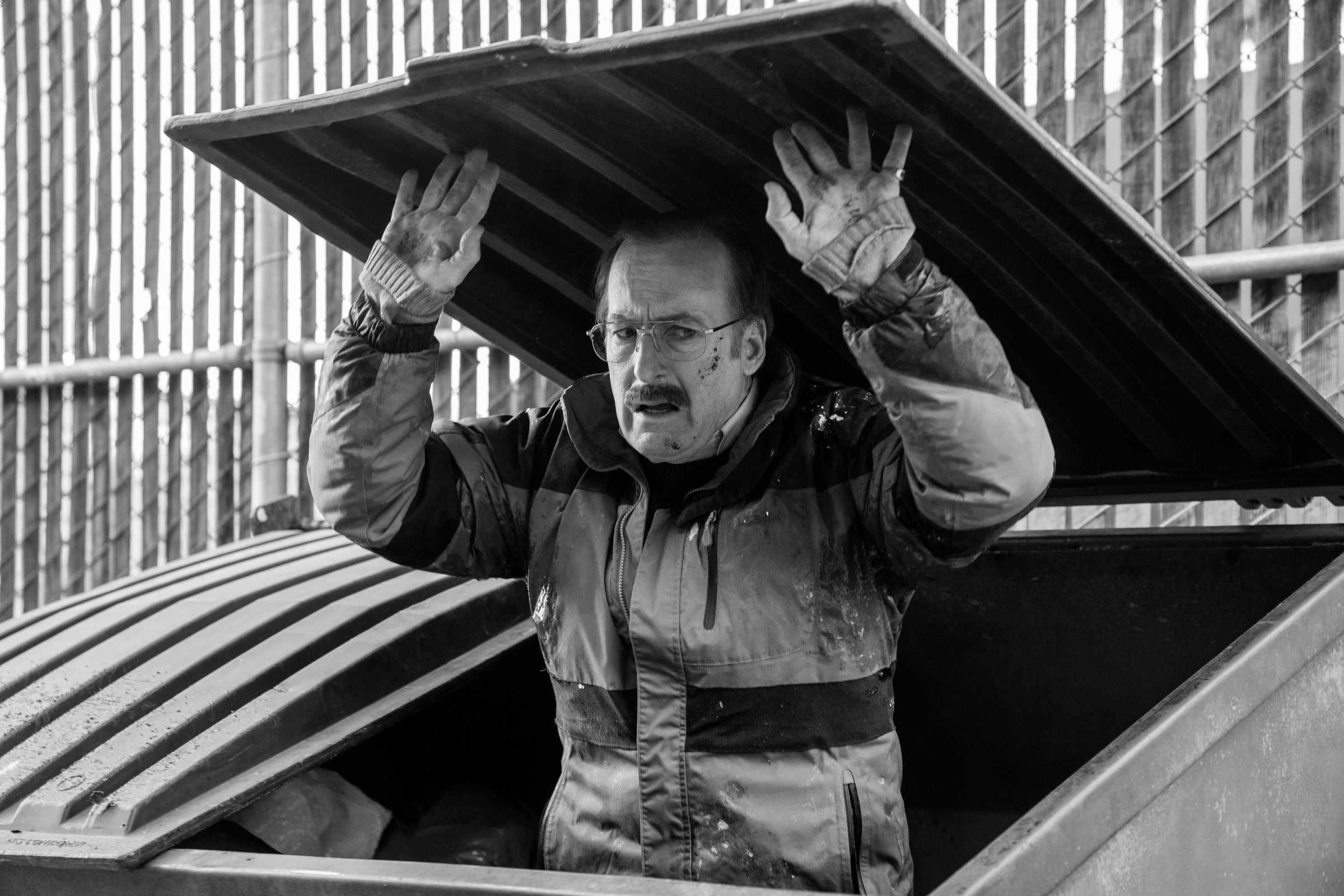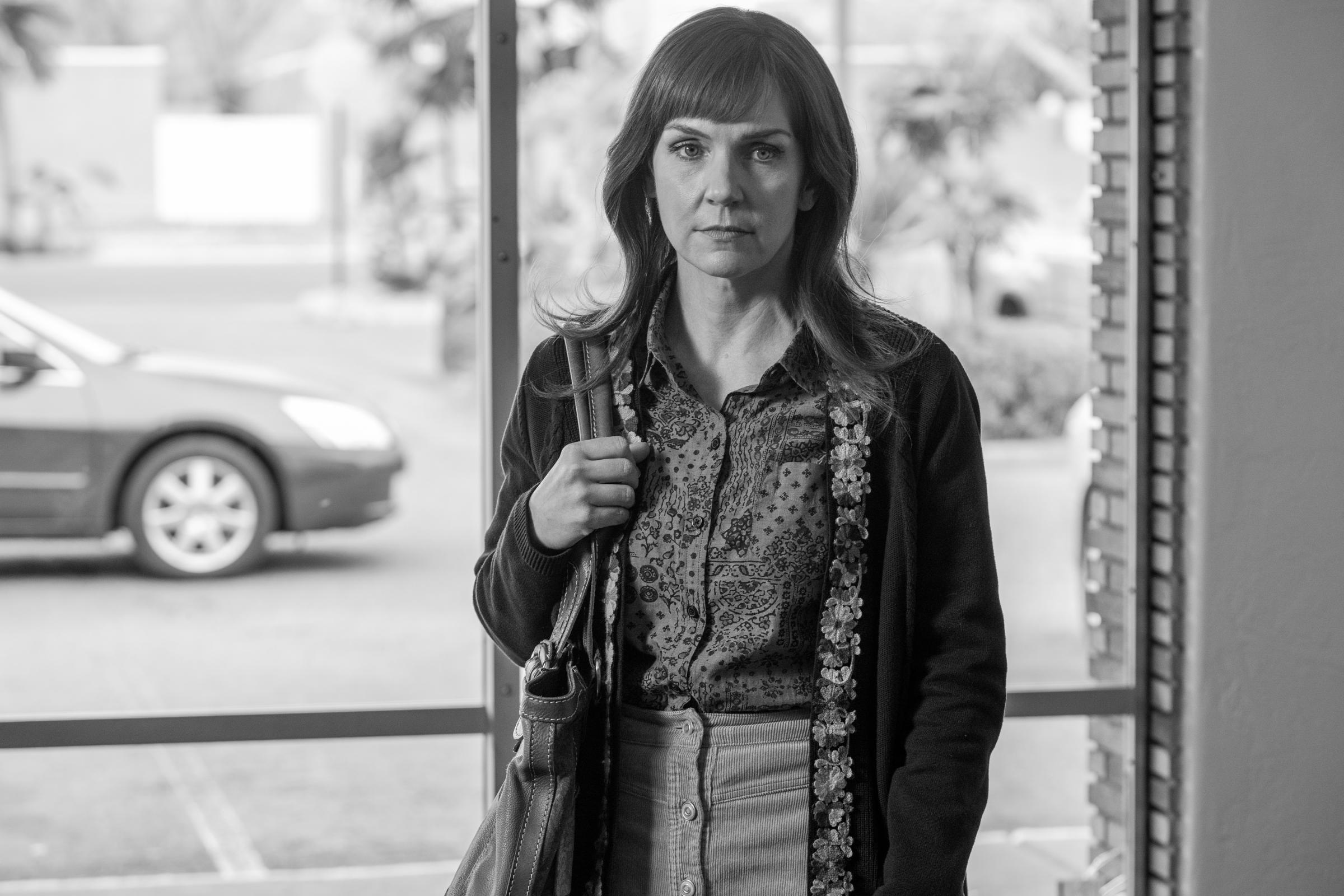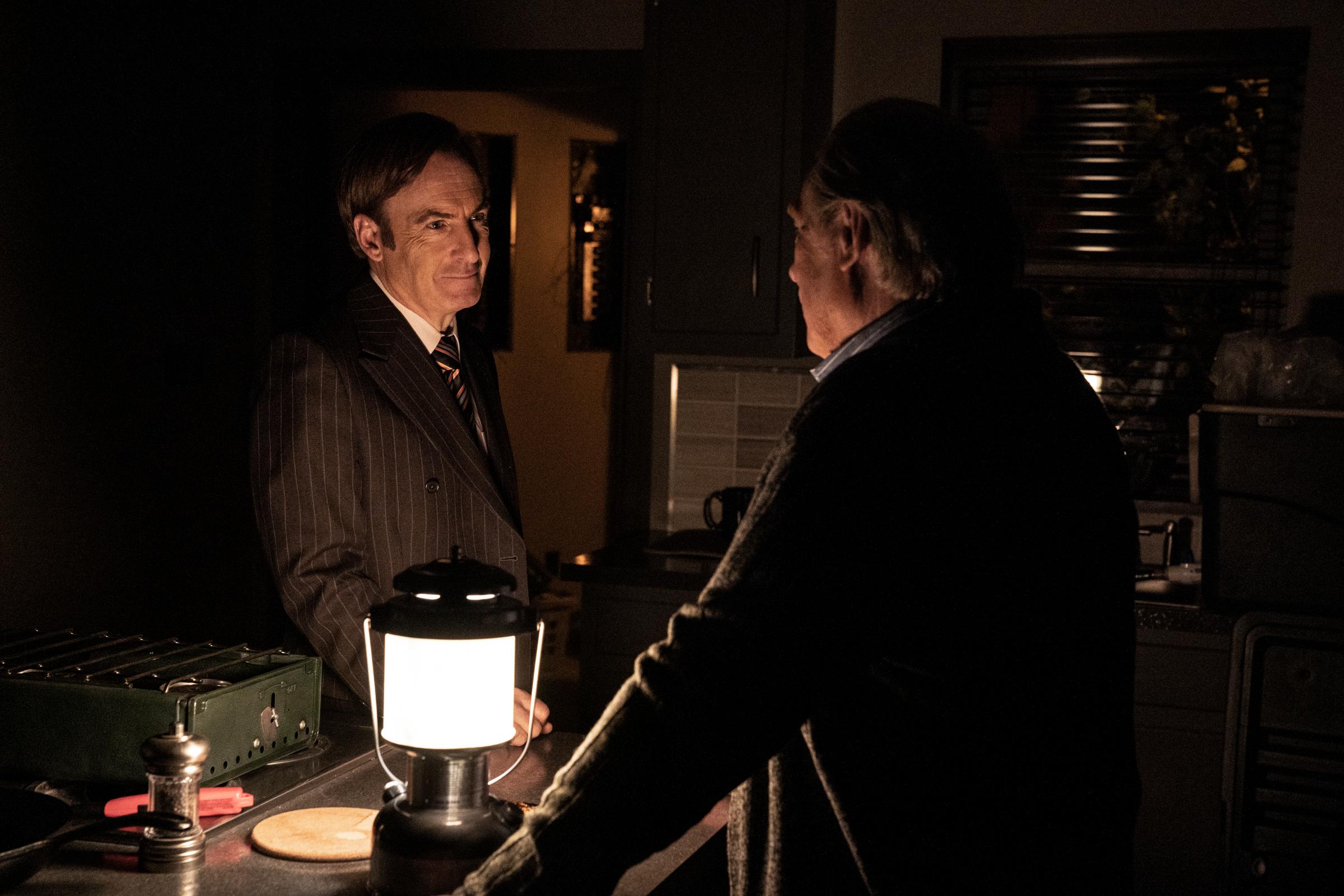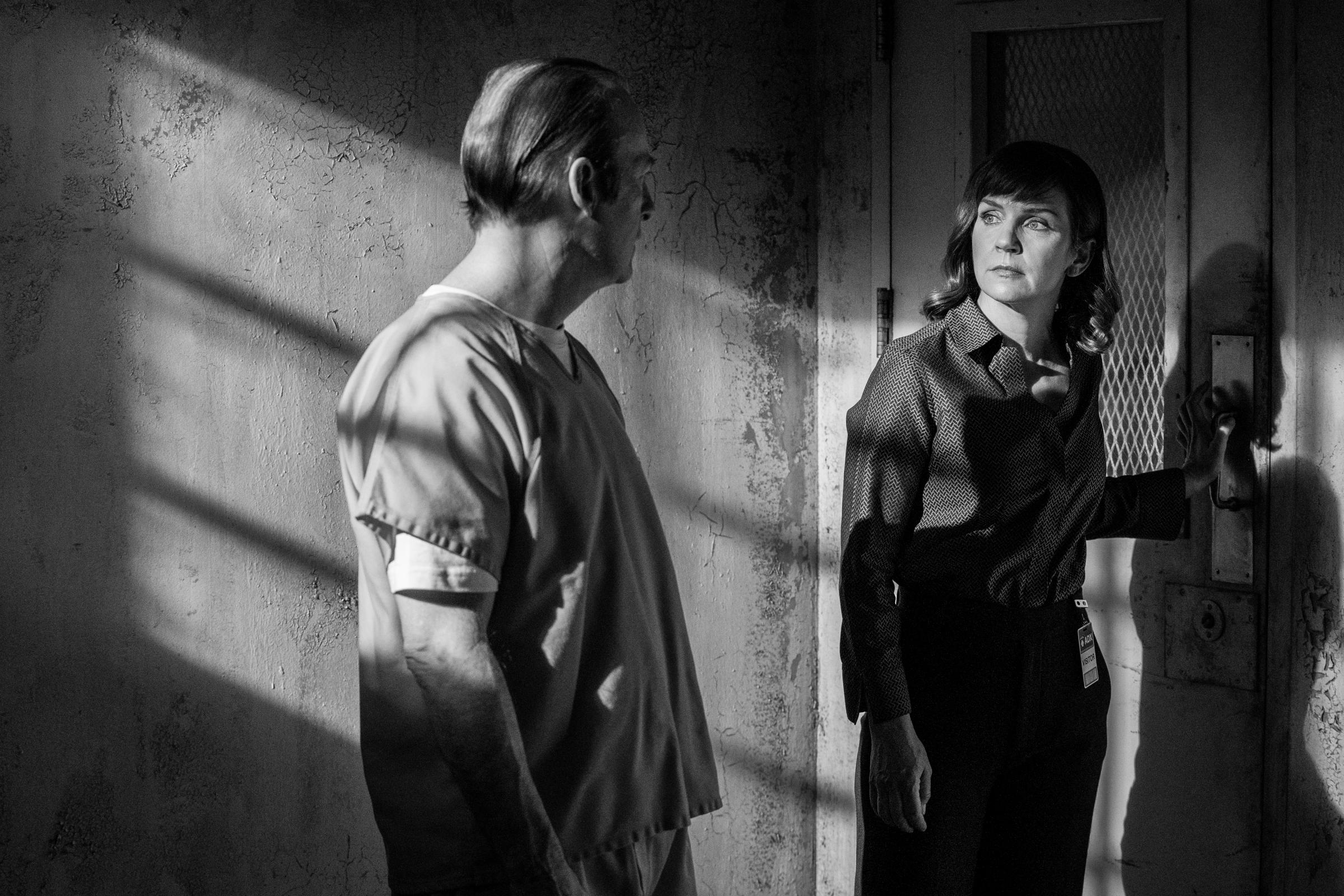
Spoiler alert: This piece discusses, in detail, the series finale of Better Call Saul.
In the penultimate episode of Better Call Saul, which aired its finale on Monday, estranged spouses Kim Wexler and Saul Goodman—né James “Jimmy” McGill and later known as Gene Takovic—reunite to formally dissolve their marriage. Kim (Rhea Seehorn) visits Saul’s (Bob Odenkirk) strip-mall law office, a mecca for petty criminals in search of shady representation, to sign the divorce papers, and her eyes drift to the decor: an absurdly large desk, a statue of Lady Justice with her scales, walls papered with the Constitution and bracketed by Greek revival pillars that recall the Supreme Court building. “What do you think?” Saul asks. “Pretty great, right?” All she can manage to say is: “Yeah, it’s, um… yep.”
Because we’ve gotten to know the intelligent, idealistic Kim so intimately through Seehorn’s riveting performance over the past six seasons, it’s easy to imagine what she’s really thinking: that Saul has made a mockery of the values that brought her and Jimmy, the struggling public defender we meet in the series premiere, together. Once committed to helping the little guy, even if that meant deviating from the letter of the law, he’s now found fortune and fame by surrounding himself with the tackiest signifiers of his profession and building a reputation as the criminal-defense equivalent of an ambulance chaser. There could be no other trajectory for the protagonist of a show about justice and its inevitable perversion. Creators Vince Gilligan and Peter Gould are known for condensing complex themes into potent images, and the episode opens with Saul bouncing a ball off his Constitution wall until a flimsy pillar falls across his desk.
Breaking Bad fans have always known that Saul was heading in this direction. For us, the surprise was that initial glimpse of Jimmy as a reformed scammer turned courtroom crusader. Later, what propelled many of us through the seasons was the attachment we developed to Kim, who turned out to be the show’s moral center—not just the proverbial woman who made Jimmy want to be a better man but a hero in her own right—and who, as many nervously noted, was no longer a part of Saul’s life by the time Walter White walked into it. Contrary to our worst fears, Kim survives. But when she leaves Saul, the last dregs of his professional dignity, of his desire to serve justice rather than to settle scores or line his own pockets, trickle out behind her.
Read more: The 10 Best TV Shows of 2022 So Far

In the first scene after Kim departs from the apartment they shared, Saul wakes up tangled in garish, tiger-print bedding, next to a snoring sex worker. His new home has a Baroque-via-Versace aesthetic, with lots of gold paint, stained-glass windows, and wall-sized replicas of fleshy Renaissance art. “I’m so sorry, I’m getting another call,” he tells a client, before putting down his phone and taking a blow dryer to his audacious comb-over. His breakfast is a Nutri-Grain bar in a plastic wrapper that boasts “real fruit.” Upon arriving at his office, he hangs a disability parking permit in his window. A mammoth inflatable Statue of Liberty, tethered to the building’s roof, waves in the wind. “Let justice be done, though the heavens fall,” he declares into the intercom at his desk, in an empty invocation of a legal maxim after Kim’s own heart. Every element of his life without her is a lie or a fake or a reproduction or a performance. The idea of justice is a sick joke. “It’s showtime,” Saul says in the finale, as his criminal trial begins.
His story line is hardly the only one in the show to constitute a travesty of justice. Earlier in the same episode, Mike Ehrmantraut (the great Jonathan Banks) tracks down the father of Nacho Varga (Michael Mando, an undersung member of an ideal cast), whose murder at the hands of the bloodthirsty Salamanca family he was ultimately compelled to abet. “Your son made some mistakes,” says Mike, clearly thinking of his own broken boy. “He fell in with bad people. But he was never like ’em, not really. He had a good heart.” At least “you won’t have to worry about the Salamancas. Their day is coming. There will be justice.” Nacho’s father shakes his head. “What you talk about is not justice. What you talk of is revenge,” he says, before adding, in Spanish: “You gangsters and your ‘justice.’ You’re all the same.” His words wound Mike, who likes to think his hypercompetence and lack of malice separate him from monsters like the Salamancas. But the father is right. Vigilante violence is also a perversion of justice; so was the fate of Nacho, a young man with immense potential who spent years trying to escape the criminal underworld.

In the opposite corner of the moral matrix—the lawful evil to Nacho’s chaotic good, if you will—sits Saul’s late brother Chuck (Michael McKean), whose obsession with laws and legitimacy helped catalyze his descent into suicide midway through the show’s run. Chuck’s concept of justice, which privileged rules above genuine ethics or benign intentions, was at least as hollow and self-serving as Mike’s own moral code. The finale reminds us of that, in a flashback where Jimmy delivers groceries to his housebound brother, who responds to the ice-packed cooler of food by sniffing: “I’m hoping you didn’t steal that from a hotel ice machine.” (After Chuck’s death, the show explored the dire consequences of hypocritical, elitist mindsets like his across a justice system that doesn’t truly believe in rehabilitation.) Jimmy’s devolution into Saul is depressing, in part, because of the extent to which his justice-themed kitsch echoes Chuck’s superficial grasp of what it means to be a good lawyer. Both brothers hide their selfish motives in the letter of the law; in Saul’s case, said text just happens to be printed on his office walls.
Read more: How Better Call Saul’s Final Season Connects to Breaking Bad
Only Kim ends up living by a definition of justice that isn’t clouded by self-interest, and that existence is anything but glamorous. A snoozy desk job in Florida, a boyfriend who frets over the right kind of mayonnaise to put in a potato salad, a group of interchangeable girlfriends, a mousy dye job that literally hides her light—this is the artificially sweetened, Miracle Whip version of a life. And she very nearly manages to blow up that sun-drenched purgatory when she confesses her role in the death of Howard Hamlin (Patrick Fabian) to both his widow and the DA. Kim has suffered more than enough for the harm she and her ex-husband caused together, yet at one point in the series finale it seems inevitable that she’ll be ruined by civil, if not criminal, charges in yet another miscarriage of justice perpetrated by Saul Goodman.
Instead, in a final twist that made me gasp out loud, he takes advantage of the broken system to give her the vindication she deserves. Representing himself at his trial, he lures Kim to court with the suggestion that he’s going to throw her under the bus and gives one of his signature speeches, the kind that has already convinced the prosecutor to offer a plea deal that would reduce Saul’s sentence to just seven years to avoid having to trust a jury to see through his performance of victimhood. But this time, he uses his power to manipulate the system for an unselfish purpose: to divert all the blame, more than even he should have to shoulder, onto himself. And he does a virtuosic job, landing himself a whopping 86 years behind bars.

His subsequent, arguably well-earned, reclamation of his good name, Jimmy McGill, fails. On the bus en route to prison, his fellow criminals immediately recognize him as the guy from the commercials and start chanting “Better Call Saul.” But he’s Jimmy again to Kim, when she comes to visit him in the slammer, looking partially recovered from her flop era with the curl back in her hair, and they smoke one more cigarette against the wall together. If his fatal flaw was an inability to stop scheming, then hers was an irrepressible propensity to trust an unjust system. Jimmy’s great act of heroism was to use his inherent crookedness to give Kim the justice her inherent honesty never would’ve yielded. Forget Bridgerton—that’s a romance for the ages.
And it’s a conclusion that rings true to real life in the present-day U.S. More often than not, when a TV series is described as timely or relevant it’s because it literally parallels a specific cultural moment: a show about workplace sexual harassment in the #MeToo era, or a show about a pandemic during a pandemic. Among the many elements that distinguished Saul from Breaking Bad—and made it the superior of the two classics—was its rigorous engagement with justice, a preoccupation whose creeping pessimism proved timely in a more artful, profound way. Debuting in the long lead-up to the 2016 election, it unfurled its disconcerting observations into a culture inundated with misinformation and disinformation, Constitutional crises and Supreme Court chaos, where laws protecting women’s bodily autonomy are struck down while laws that would save children from being gunned down at school almost never gain traction.
If The Wire became a classic by showing us the crumbling of America’s institutions, then Better Call Saul deserves a place in the canon for the vividness with which it captured something less tangible but more elemental: Americans’ crumbling faith in the values that once gave those institutions meaning. It leaves us with a final question, too: Is the perversion of justice inevitable in any society, under any circumstances, or just within this particular society and the justice system it has built? If only Kim Wexler were a real person, I’d call her up and ask.
More Must-Reads From TIME
- The 100 Most Influential People of 2024
- Coco Gauff Is Playing for Herself Now
- Scenes From Pro-Palestinian Encampments Across U.S. Universities
- 6 Compliments That Land Every Time
- If You're Dating Right Now , You're Brave: Column
- The AI That Could Heal a Divided Internet
- Fallout Is a Brilliant Model for the Future of Video Game Adaptations
- Want Weekly Recs on What to Watch, Read, and More? Sign Up for Worth Your Time
Contact us at letters@time.com